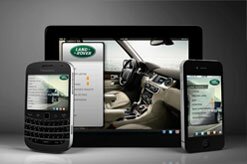Race2Recovery readies for 2013 Dakar with Land Rover
Race2Recovery, the team of wounded servicemen aiming to be the first disabled crew to complete the Dakar Rally, has successfully completed their final training session ahead of the race in January 2013. The team’s aim of completing one of the toughest tests of man and machine is to raise money for Tedworth House, a rehabilitation centre for injured service personnel.
The Land Rover and Royal Foundation-sponsored team flew out to Marrakech to take advantage of similar terrain to that which they’ll experience on the Dakar in South America. They’ll travel through Peru, Argentina and Chile across a varied landscape that includes rough boulder fields and sand dunes. The Land Rover-provided training aimed to enhance the crew’s skills in negotiating tricky terrain, dune driving, orienteering, vehicle sympathy and recovery – all vital skills if they’re to successfully complete the Dakar.
The 11 strong team drove eight hours on a south easterly bearing in Land Rover Defenders from Marrakech across the snow-covered Atlas Mountains towards Ouarzazate. From there it was on to Foum Zguid near the Algerian frontier before they headed off-road through rough challenging boulder fields to the edge of the dunes. They camped out overnight, just as Race2Recovery will do during the Dakar, and vehicle checks were performed ahead of the following day.
Off-road expert Mark Cullum who will drive a T4 support truck in the race, led the training session which involved driving across ‘sand seas’ known locally as ‘Ergs’. His extensive personal experience taught the team the way to approach sand dunes, how to identify soft and hard sand and how to recover a car should it become stuck. Lessons including appropriate tyre inflation and deflation according to terrain were also learned.
The training also allowed the injured servicemen to understand how varying temperatures, snow, sand and dust would affect their artificial limbs including hydraulics, knuckles and other moving parts.
Mark Cullum said: “The main focus for this level of training was to get the guys reading advanced terrain changes and negotiating sand seas and razor dunes similar to the terrain they will find in South America.
“Much of the training focus was also on teaching a restrained, sympathetic and alert driving style to protect the vehicle and crew and ensure the appropriate mechanical sympathy to complete the Dakar.”
Captain Tony Harris, a below-the-knee amputee who will be driving one of the four Defender-based Wildcats in the rally said: “The past few days, together with the earlier training session out here in November, has provided us with knowledge, understanding and most importantly increased confidence to competently negotiate the tough varied terrain we face in January.
“With less than a month to go before the start of the race, we are in a good position with a strong crew and I am confident of our chances to be the first disabled team to finish the Dakar.”
The Race2Recovery team will start the 2013 Dakar on the 5th January and aim to cross the finish line 20 days later covering in excess of 6000 miles. Live updates from the team during their endeavour can be found at: www.race2recovery.com and landrovermena.com, on Facebook on Race2Recovery and www.facebook.com/landrovermena or on Twitter: @race2recovery, @landrovermena and @landroverukpr.
A five-part documentary series will air on British Eurosport this Christmas entitled “The Road to Dakar” following the Race2Recovery team’s attempt to enter the Dakar Rally, directed by award winning documentary maker Tim Pritchard.










